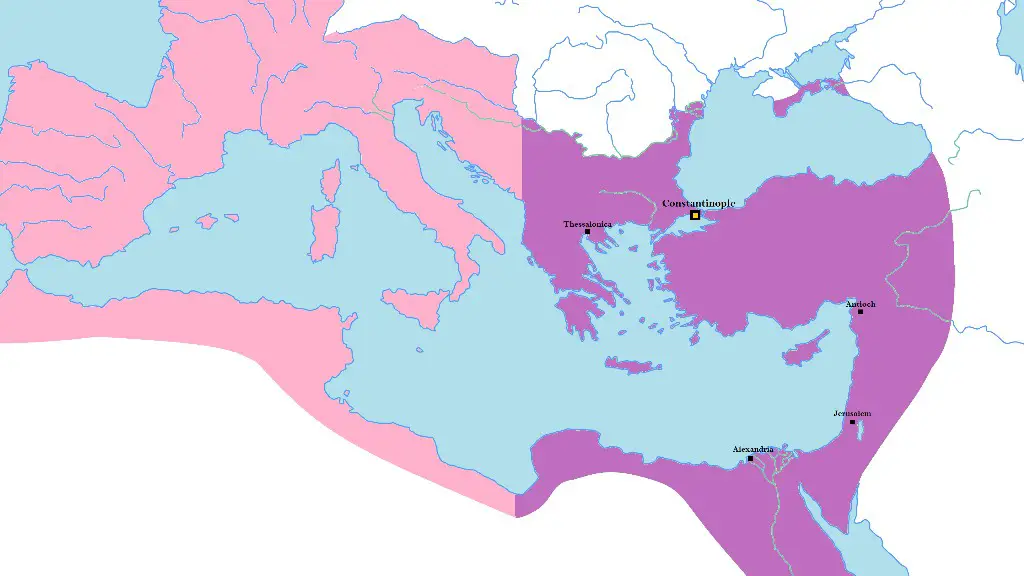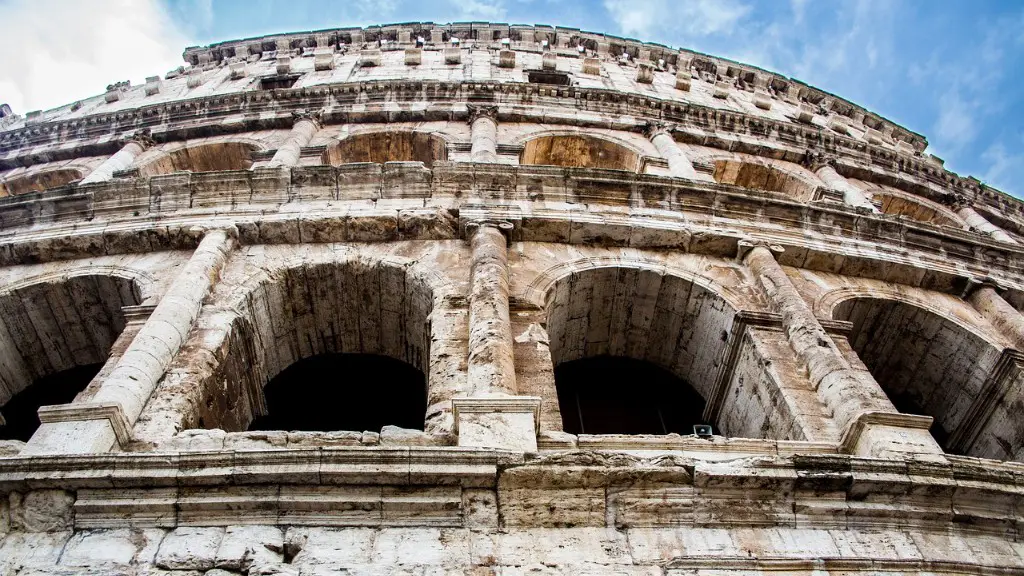The rise of Christianity in Ancient Rome was an unexpected event that took place in the first few centuries of the common era. It was the new religion’s ability to stand up against the Roman power, and reach its people that made it so successful. While Rome had many other beliefs in its population, Christianity was the only religion to truly make a serious impact. From its humble beginnings, Christianity rapidly grew from an underground faith to being the official religion of the Roman Empire under Emperor Constantine in the fourth century.
The main source of Christianity’s success lies in its ability to make a strong connection with the Roman people. Rather than being viewed as an alien belief, Christianity was seen as an extension of the Roman faith, offering a new and personal relationship with their God that was both comforting and powerful. For the common people, it provided stability and assurance in a time of chaos and troubled economic times. Additionally, the teachings of Jesus of Nazareth resonated with Romans, and his messages of love and mercy found a home within the Empire.
A great example of how Christianity quickly established a foothold in the Roman Empire can be seen through the writings of St. Paul. His letters to the churches of the Roman Empire were some of the earliest Christian texts we have, and it was his mission to bring the new faith to the people of the empire. Within a few decades, Christianity had made its way from being an obscure sect to a powerful religion in its own right.
To this day, the rise of Christianity in Ancient Rome remains a watershed moment in world history, and it is seen as the moment when the faith truly established itself as a world religion. The impact of the Roman Empire in spreading Christianity can be thought of as a turning point in human history. Christianity, in its various forms, has become one of the world’s leading religions, and the early roots of its growth and acceptance can be found in Rome.
The Spread of Christianity Across the Roman Empire
The spread of Christianity across the Roman Empire was a lengthy process that extended over centuries. From its roots in the Middle East and North Africa, the word and teachings of Jesus of Nazareth began to spread into other areas as Roman power expanded. Eventually, as Roman governance took hold, Christianity followed with it, becoming a part of the established order within the Empire.
By the fourth century, Christianity had made serious inroads in the Empire, with the new religion being tolerated by Roman leaders and gaining a significant following.The rise of Emperor Constantine to the imperial throne was a major tipping point in the history of Christianity. His Edict of Milan in 312 AD declared Christianity to be a legal religion in the Empire, and it ushered in a period of great growth for the new faith.
The next few centuries saw Christianity continue to spread throughout the Roman world, and it cemented its place as a major force in the culture and faith of the Empire. This period would also be one of great growth for different Christian sects and dogmas, allowing Christianity to become the religion that we know today.
The Long-Term Impact of Christianity in the Roman Empire
The long-term impact of Christianity in the Roman Empire was far-reaching and profound. It had a deep influence on the culture and beliefs of the Roman world and was the dominant faith for centuries. In fact, the influence of this faith can still be seen in many aspects of life and culture today. Christianity helped to form the moral and ethical foundations of the modern world and provided a basis of understanding that continues to shape society today.
Christianity also had a deep impact on Roman government and politics. Religious and civil laws were largely based on Christian morality and the church had deep influence in important political decisions. This had an effect on the subsequent cultures and civilisations that arose out of the former Roman Empire.
At the same time, the rise of Christianity in Ancient Rome meant that the people of the Empire were no longer held to one particular religious belief. It opened the door for other faiths to arise, and to be accepted, making Rome a much more open and inclusive society than it had been before.
Persecution of Christianity in Ancient Rome
Persecution of Christianity in Ancient Rome was a part of the story, though it was not as common as some may believe. While the Roman Empire was often hostile to those of different faiths, there was a period of tolerance for Christianity, with the faith being granted a degree of respect from Roman rulers.
At times, pressure from both outside forces and within led to some persecution of Christians. This began most significantly with Emperor Nero in 64 AD, when Christians were blamed for a devastating fire that hit Rome. In later years, more extreme persecution involved the Roman emperor Diocletian and his attempt to revive Paganism as the official religion of the Empire. However, his attempts were not successful, and Christianity continued to increase in popularity across the Empire.
The Legacy of Christianity in Ancient Rome
The legacy of Christianity in Ancient Rome is one of both progress and perseverance. Its rapid growth and ultimate success in the Roman Empire is remarkable, and it is a testament to the faith’s strength and determination. Christianity provided a deep sense of comfort and hope for the people of the Roman Empire and its influence can still be felt in many aspects of the world today.
It also played a major part in the eventual downfall of the Roman Empire itself, with Christianity providing an alternative spiritual answer to the political structure of the Empire. The spread of the religion provided the people with an alternative power structure, one that was based on faith rather than violence and domination.
The legacy of Christianity in Ancient Rome is one that has seen its impact throughout history, and it can still be seen in many aspects of modern life. It provided a foundation of faith that permeates many of the world’s societies, and its teachings have guided and shaped the way we understand the world today.
The Influence of Other Religions on Christianity in Rome
While Christianity was clearly the dominant belief in Ancient Rome, it had a deep influence on other faiths, and vice versa. Other religions, such as Judaism and Paganism, had a lasting influence on Christianity, as certain aspects of their beliefs were assimilated and incorporated into the new faith.
At the same time, Christianity also had an influence on other beliefs in the Roman Empire. Pagan practices, for example, were changed and adapted over time, with some aspects being adopted by followers of the new religion. Other religions also adapted and borrowed from the teachings of Christianity, allowing them to remain relevant in a changing world.
The influence of other religions on Christianity in Ancient Rome is an important part of the history of the faith, and it is a reminder of how interconnected the various belief systems were in the Roman world. It is a testament to the strength and power of the faith, and its ability to accept and be influenced by outside sources.
Conclusion of the Rise of Christianity in Ancient Rome
The rise of Christianity in Ancient Rome is one of the most captivating and impactful moments in all of human history. This period of Christian expansion saw the faith go from being an obscure and underground sect to being the official religion of the most powerful Empire in the world. Its influence has been felt for centuries, and its legacy can still be seen in many aspects of the modern world.
At the same time, the story of Christianity in Ancient Rome is one of adaptation and growth. It was accompanied by other faiths, some of which had a deep influence on the new religion, while the faith of Christianity also influenced other beliefs in the Roman world. This interplay between different beliefs is an important part of the history of Christianity and a reminder of the interconnectedness of belief systems.





